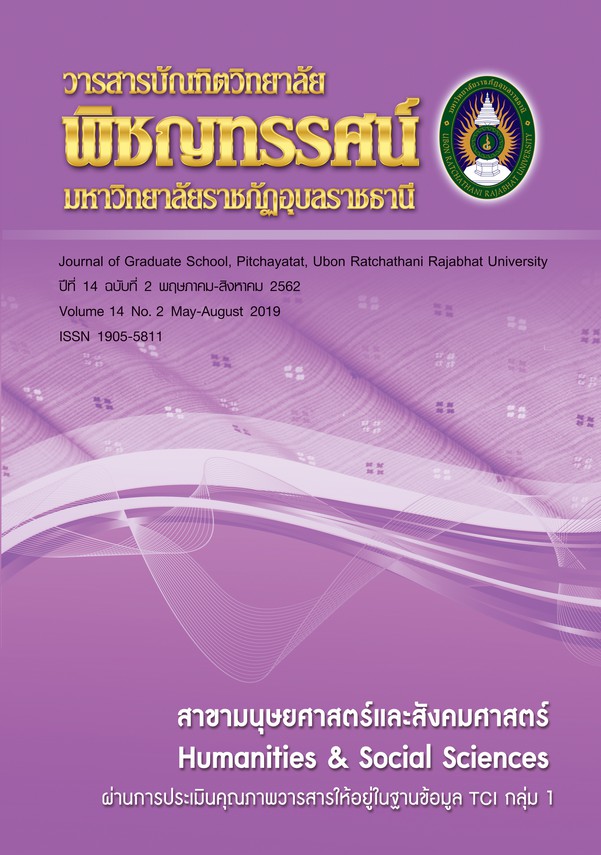ระบบการให้ค่าตอบแทน ผลประโยชน์และรางวัลเพื่อก่อให้เกิดความผูกพันทุ่มเทในธุรกิจโรงแรม
คำสำคัญ:
ปัจจัยจูงใจ, ปัจจัยค้ำจุน, ค่าตอบแทน, ความผูกพัน, ธุรกิจโรงแรมบทคัดย่อ
การวิจัยครั้งนี้มีวัตถุประสงค์เพื่อ 1) ศึกษาความสัมพันธ์ระหว่างช่วงอายุของพนักงานและปัจจัยที่ส่งผลต่อแรงจูงใจในการทำงานของพนักงานโรงแรม 2) เปรียบเทียบระดับความคิดเห็นปัจจัยที่ก่อให้เกิดความผูกพันในองค์กรกับภูมิหลังของพนักงาน 3) ศึกษาความสัมพันธ์ระหว่างปัจจัยจูงใจและปัจจัยค้ำจุนกับความผูกพันในองค์กรของพนักงานโรงแรม และ 4) เพื่อศึกษาอิทธิพลของปัจจัยจูงใจและปัจจัยค้ำจุนต่อความผูกพันในองค์กรของพนักงานโรงแรม ตัวอย่างเป็นพนักงานโรงแรมจำนวน 300 คน คำนวณจำนวนตัวอย่างโดยใช้สูตร Yamane และใช้วิธีการสุ่มตัวอย่างแบบเทียบสัดส่วน เครื่องมือที่ใช้ในการวิจัยเป็นแบบสอบถามเกี่ยวกับข้อมูลทั่วไป ค่าตอบแทน ผลประโยชน์และรางวัล ปัจจัยที่ก่อให้เกิดความผูกพันในองค์กร สถิติที่ใช้คือ ค่าความถี่ ร้อยละ ค่าเฉลี่ย ส่วนเบี่ยงเบนมาตรฐาน ใช้สถิติ ไคสแควร์ (Chi-Square) การเปรียบเทียบความแตกต่างของค่าที (t-Test) และทดสอบค่าเอฟ (F-Test) ด้วยการวิเคราะห์ความแปรปรวน (One-Way ANOVA) โดยใช้วิธีทดสอบแบบ LSD หาค่าสัมประสิทธิ์สหสัมพันธ์ของเพียร์สัน และใช้สถิติการวิเคราะห์การถดถอยแบบพหุคูณ (Multiple Regression Analysis) ผลการวิจัยพบว่า อายุ มีความสัมพันธ์กับปัจจัยจูงใจที่ก่อให้เกิดความผูกพันในองค์กรในเรื่องด้านความสำเร็จในการทำงาน และด้านการได้รับการยอมรับ อย่างมีนัยสำคัญทางสถิติที่ระดับ .05 พนักงานโรงแรมที่มีแผนกงานต่างกัน มีระดับความคิดเห็นต่อปัจจัยจูงใจและปัจจัยค้ำจุนที่ก่อให้เกิดความผูกพันในองค์กร โดยรวมแตกต่างกันอย่างมีนัยสำคัญทางสถิติที่ระดับ .05 ปัจจัยจูงใจและปัจจัยค้ำจุนมีความสัมพันธ์กับความผูกพันในองค์กร โดยรวมอย่างมีนัยสำคัญทางสถิติที่ระดับ .01 โดยมีความสัมพันธ์ในเชิงบวก ในระดับปานกลาง ปัจจัยจูงใจและปัจจัยค้ำจุนสามารถร่วมกันพยากรณ์ความผูกพันในองค์กร ได้ร้อยละ 47.8 อย่างมีนัยสำคัญทางสถิติที่ระดับ .05 โดยตัวแปรที่สามารถพยากรณ์ได้อย่างมีนัยสำคัญทางสถิติ ได้แก่ ปัจจัยจูงใจด้านความรับผิดชอบในงาน ปัจจัยจูงใจด้านการได้รับการเลื่อนตำแหน่ง ปัจจัยค้ำจุนด้านค่าตอบแทนและผลประโยชน์ ปัจจัยค้ำจุนด้านสภาพแวดล้อมทางกายภาพในการทำงาน และปัจจัยค้ำจุนด้านสถานภาพ (สถานะของอาชีพ)
เอกสารอ้างอิง
การให้บริการอาหารและเครื่องดื่ม. (ออนไลน์) 2555 (อ้างเมื่อ 2 มกราคม 2559). จากhttp://www.iho telguru.com/index.php?option=com_ k2&view=item&id=89:fateware-andglass es-for-dining-table
คริสทอป เลอเฌอน. โรงแรมยังขาดแคลนแรงงาน (ออนไลน์) 2560 (อ้างเมื่อ 5 มกราคม 2560). จาก https:// www.posttoday.com/biz/news/473869.
ธนาคาร ขันธพัด. ปัจจัยจูงใจ ปัจจัยค้ำจุน เเละคุณภาพชีวิตในการทำงานที่ส่งผลต่อควาามจงรักภักดี ของผู้ปฏิบัติงานในองค์กร กรณีศึกษา การไฟฟ้าฝ่ายผลิตแห่งประเทศไทย. บริหารธุรกิจมหาบัณฑิต มหาวิทยาลัยกรุงเทพ, 2558.
บุญธรรม กิจปรีดาบริสุทธิ์. ระเบียบวิธีการวิจัยทางสังคมศาตร์. พิมพ์ครั้งที่ 10. กรุงเทพ: จามจุรี โปรดักท์, 2551.
ปกรณ์ ลิ้มโยธิน. ความตั้งใจจะลาออกจากงานของ พนักงานโรงแรม. เอกสารประกอบการประชุม วิชาการด้านการ บริหารจัดการ.ครั้งที่ 4: มหาวิทยาลัยสงขลานครินทร์, 2555.
ประกิจ ชินอมรพงษ์. โรงแรมเชนไทยสู้ศึกเชนนอกก่อน สูญพันธ์ (ออนไลน์) 2555 (อ้างเมื่อ 30 ตุลาคม 2558).จาก http://www2.manager.co.th/ iBizChannel/ViewNews.aspx ?NewsID=9530000085240
ปีเตอร์ เอนลีย์. ออนิกซ์ฯ” ปรับแผน 10 ปี โชว์ผลงาน 6 ปีกำไรพุ่ง 85% (ออนไลน์) 2557 (อ้างเมื่อ 30 ตุลาคม 2558). จากhttp://www.manager. co.th/iBizChannel/ViewNews.aspx ?NewsID=9570000124520.
พวงเพ็ญ ชูรินทร์. ความสัมพันธ์ระหว่างวัฒนธรรมองค์กร ความเครียด และความพึงพอใจ ในงานที่มีผลต่อความคงอยู่ของพนักงานโรงแรมในเขตภาคใต้ตอนบนภายใต้สถานการณ์ของภาวะเศรษฐกิจตกต่ำ. วารสารวิชาการอิเลคทรอนิกส์ท่องเที่ยว ไทย นานาชาติ. 3 (มิถุนายน 2552):1-15.
วิโรจน์ ลักขณาอดิสร. กลยุทธ์ HR ที่จับต้องได้. พิมพ์ครั้ง ที่ 4. กรุงเทพฯ: สำนักพิมพ์ สมาคมส่งเสริมเทคโนโลยี (ไทย-ญี่ปุ่น), 2551.
วิจัยด้านตลาดการท่องเที่ยว, ศูนย์. สถิตินักท่องเที่ยว ระหว่างประเทศ. (ออนไลน์) 2560 (อ้างเมื่อ 1 มีนาคม 2560). จากhttp://tatic.tourism thailand.org
GLOBAL HOTEL RANKING. (Online) 2015 (Cited November 15, 2016). Available from: http://hospitality-on.com.
Hackman, R. E. and Suttle, L. J. Improving Life at Work: Behavioral Science Approach to Organizational Change. Santa Monica, California: Goodyear Publishing, 1977.
Kandasamy, I. and Ancheri,S. Hotel employees’ expectations of QWL: A qualitative study. International. Journal of Hospitality Management, 28 (2009): 328-337.
ดาวน์โหลด
เผยแพร่แล้ว
รูปแบบการอ้างอิง
ฉบับ
ประเภทบทความ
สัญญาอนุญาต
บทความทุกเรื่องได้รับการตรวจความถูกต้องทางวิชาการโดยผู้ทรงคุณวุฒิภายนอกอย่างน้อย 3 คน ความคิดเห็นในวารสารพิชญทรรศน์เป็นความคิดเห็นของผู้นิพนธ์มิใช่ความคิดเห็นของผู้จัดทำ จึงมิใช่ความรับผิดชอบของวารสารพิชญทรรศน์ และบทความในวารสารพิชญทรรศน์สงวนสิทธิ์ตามกฎหมายไทย การจะนำไปเผยแพร่ต้องได้รับอนุญาตเป็นลายลักษณ์อักษรจากกองบรรณาธิการ





